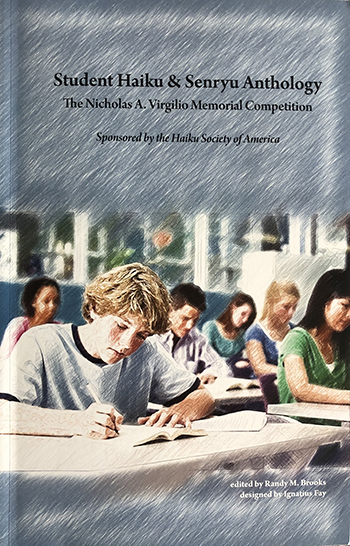Haiku Society of America Educational Resources
The Haiku Society of America is pleased to provide resources to those teaching and learning the literary art of haiku. Many of these resources are assessible to a wide range of learners including children. Others have been developed for engagement by specific age groups. Note that the Haiku Sociey of America mentorship program also has several PDF guides to online resources.
Please know that the following web pages provide resources for a specific audience but should NOT exclude anyone from considering resources from any category!
~
Introductory Workshops
Specific Tecnhiques
Scott Mason - Haiku Course
How-To Haiku Books
Recommended Books to Read
~
Teaching Haiku in Higher Educaiton
Art of Reading & Writing Haiku
Millikin Haiku Anthology
Articles & Online Resources
Recommended Books
~
Workshops & Lessons
Student Haiku Award Collection
Haiku Unit Plan
Haiku Cut Competition
Articles & Online Resources
Recommended Books
~
Haiku Unit Plan
Workshops & Lessons
Articles & Online Resources
Recommended Books
~
Haiku Organizaitons & Societies
Haiku Leaders & Teachers
Haiku Podcasts
Haiku Archives & Directories
~
For Scholars & Literary Criticism
(direct links to the following)
HSA Definitions
Scholar’s Library of Haiku
Bibliographies
Frogpond Essays
Frogpond Book Reviews
~ ~ ~
Definitions of Haiku & Related Terms
HAIKU - a haiku is a short poem that uses imagistic language to convey the essence of an experience of nature or the season intuitively linked to the human condition.
SENRYU - a senryu is a poem, structurally similar to haiku, that highlights the foibles of human nature, usually in a humorous or satiric way.
RENKU - a renku is a linked-verse poem in the popular haikai style, particularly as practiced by Bashô and later poets writing in his style.
HAIBUN - a haibun is a terse, relatively short prose poem in the haikai style, usually including both lightly humorous and more serious elements. A haibun usually ends with a haiku.
See the full discussion of these definitions and the history of revisions by the Haiku Society of America from 1973 to current versions: Haiku Society of America Definitions.
~ ~ ~
